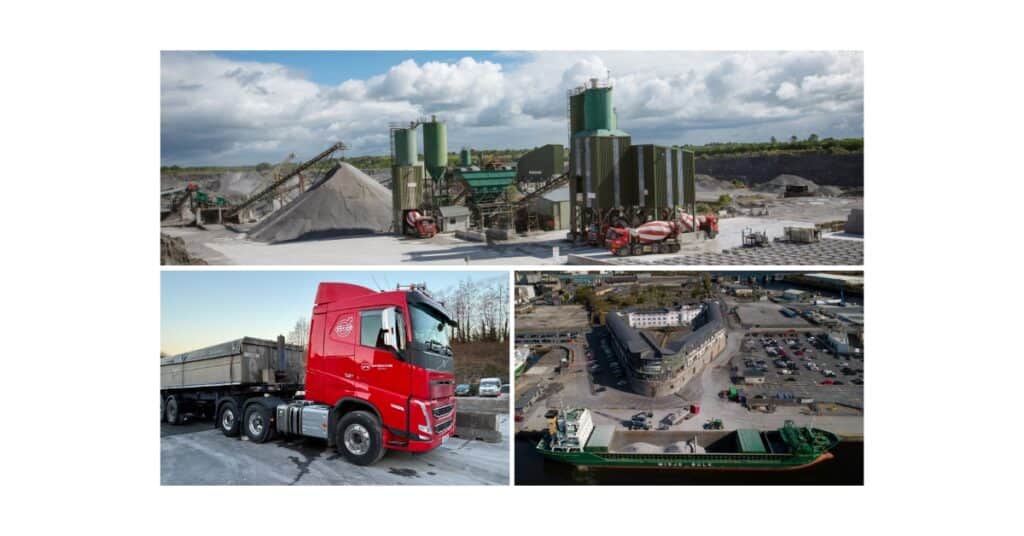FAQ
Our office is open from 8am to 5pm Monday to Friday.
Details of payment methods can be found on our invoices. If you have any questions about this, please email [email protected].
Yes, we encourage our customers to have invoices and statements sent by email. To set this up please contact [email protected].
Please contact us at [email protected].
Applying Agri lime regularly releases up to 80kgs of N/ha/Year and unlocks phosphorus (P) and potassium (K) from organic soil reserves, reducing the need for applied fertilisers.
Lime can be applied all year round, it is most effective when applied to bare soils, such as after silage harvest, as a good crop of silage can remove up to 75kg/ha of lime equivalent.
It is preferable to avoid grazing or cutting until sufficient rainfall has occurred to wash the lime off the herbage.
For silage it is better to apply lime before mid-March for first cut or within one week after cutting on land which is being closed for a second cut as the presence of lime on the grass can increase the pH in the silage pit which affects silage preservation. Applying lime to heavy covers of grass intended for silage can reduce silage quality if the lime is not washed off the grass by rain.
A recent soil report will show the rate of lime required depending on the soil type, soil pH and crop type.
Soil sampling should take place every 3-5 years to correctly monitor pH levels in the soil and ensure that soil pH is maintained in the optimum range for both grassland and tillage crops.
Apply lime on “a little and often basis” and improve soil pH in stages over time. Do not exceed 5t/ha in a single application or apply split applications (2.5t/ ha) over several years.
Applied lime can increase the loss of N to the air after slurry application.
If slurry is first applied, leave 1 week before spreading lime. If lime has been applied, avoid slurry application for three months.
The N in urea and cattle slurry are in the same form. Treat urea the same as cattle slurry as described in the previous question.
All lime marketed in Ireland must meet the requirements of S.I 248/78 – “Marketing of non-EEC Fertilisers Regulations 1978” and this is enforced by the Department of Agriculture, Food and the Marine who issue a licence to all approved operators.
Specific requirements contained in SI 248/78 are as follows:
- Product must have a Total Neutralising Value (TNV) of not less than 90%
- All the product must pass through a 3.35 mm sieve.
- Not less than 35% of the product must pass through a 0.15 mm sieve
- The moisture content of the product must be less than 3.0%
Farmcal is a range of agricultural hygiene products suitable for the control of odour and maintenance of sanitary conditions in farm and livestock buildings such as cubicles, piggeries, horse stables, lambing boxes, and general feed areas.
Slurrycal is a dual-purpose high PH lime blend for use in cubicles and livestock stalls. It is designed to provide elevated levels of protection against disease-causing bacteria in the cubicle and uniquely enhance the slurry.
Underfloor floor heating can be turned on at a low temperature 7-days after Cemfloor screed has been installed. The heating should be heated up slowly in accordance with our guidance documents.
For moisture sensitive flooring, Cemfloor screed must be dried to a moisture content of 2.5%CM or a relative humidity of 75%.
Unlike other liquid screeds, Cemfloor screed does not require sanding to remove surface laitance. It is however recommended that the surface of the screed be lightly abraded to clean and remove any building residue to ensure that there is a good key to receive subsequent floor coverings.
Some types of flooring products such as surface DPM’s, self-smoothing/levelling compounds, resin flooring, microcrete etc. may require the screed surface to be further mechanically prepared to provide a textured surface to enable adequate absorption and increased adhesion between both surfaces. For further information see our Floor Covering Preparation Guidelines document,
Cemfloor screed will be suitable for foot traffic after 24 – 48 hours.
The minimum depth of Cemfloor for each screed type is:
- Bonded Screed = 20mm
- Unbonded Screed = 30mm
- Floating Screed: Domestic Application – 35mm
- Floating Screed:Commercial Application – 40mm
- Floating Screed over underfloor heating – 40mm
The following are industries most suitable for Calcium Carbonate products:
- Agricultural
- Glass
- Industrial
- Environmental
- Construction
Congcal Calcium Carbonate tests up to 99.2% pure. This is one of the purest Calcium Carbonate in the country.
Congcal supply to over 20 countries from our bases in Ireland, Scotland and Sweden.
Congcal are accredited to Femas Standards and ISO Intergrated Management System.
Calcium Carbonate is composed of three elements which are of importance for all organic and inorganic material on our planet: Carbon, Oxygen and Calcium.
Calcium Carbonate is incorporated within paper products in two different ways: both as filler that enters the pulp before the web is formed, and as the main constituent of the coating formula, applied to the dry paper surface for further upgrading. In the manufacture of high quality printing paper, both of these processes are employed. It can be used in combination with kaolin and talc or as the sole mineral constituent of the paper.
Today over 10 million tonnes of calcium carbonate products are used annually in paper manufacturing.
Calcium Carbonate can be used in fillers and reinforcing agents in plastics production. A wide selection of calcium carbonates in both uncoated and surface coated forms is now available and in terms of volume, they are the most important fillers in the plastics industry. In thermo plastics and thermosets more than 3.5 million tonnes are used annually and growing. Even adhesives and sealants consume about 900,000 tonnes of Calcium Carbonate as filler. It can be used a large range of products e.g. PVC.
Calcium Carbonate is an essential mineral for the healthy growth and development of livestock and domestic animals. It plays an important role in the metabolic process, retention and conversion of nutrients and regulates cell activity. It also supports healthy bone and skeleton development in young livestock. Calcium is one of the main minerals needed by animals to grow, develop and produce.
Its main function in the animal is for bone and teeth formation, smooth muscle contraction, e.g. the rumen, and for blood clotting.
A deficiency or imbalance in calcium can cause poor growth rates, poor bone development, reduced milk output, displaced abomasums and more obviously milk fever. A lesser known fact is that it can also cause urinary calculi in male animals, (intact or castrated!). It is also vital for poultry to support healthy digestion and the strengthening and hardening shells.
Agricultural lime is a mineral fertiliser used to neutralise and nourish agricultural land. It corrects soil acidity and pH levels by neutralising the acids in soils so that the micro-organisms can thrive, break down plant and animal residues and free the elements required for healthy growth of the land. This is vital to maximise crop yield, animal grazing and good quality silage/hay.
We are currently one of the top producers of agricultural lime or Grolime in the West of Ireland and provide efficient and on time delivery and spreading. Our lime is tested twice annually by the Dept of Agricultural which in turn provides us with a licence to sell. We are also members of the Ground Limestone Producers Association.
CongCal Calcium Carbonate can also be used as a neutralisation agent to de-acidify lakes and rivers. Natural eco systems, habitats and drinking water can be seriously damaged by altered pH levels caused by acid rain or acidic water runoff from mines. To counteract or neutralise the damage you can engage in lake liming or spread CongCal Calcium Carbonate it increased the pH value and help to restore the natural balance of the eco system.It also can be used to neutralise acidic soil and reduce pH values, this in turn is known to produce a higher yield in crops for the agricultural industry.
Calcium Carbonate is vital to the construction industry worldwide; both as a building material (limestone aggregate) and as an ingredient in various products. It is a natural mineral with a variety of unique characteristics which in turn lead to its variety of applications in the construction industry such as buildings, roads, civil engineering projects etc.
Self Compacting Concrete
Calcium Carbonate when added to concrete promotes self-compacting properties. The product has better workability, increased strength and improved appearance with a smoother surface.
Flow Screed is designed for application for finishing flooring in residential and commercial projects, and intended for use in unbounded, bonded and floating construction. It has an excellent crushing resistant and has fibre reinforcements.
Asphalt
Calcium Carbonate is used as a multi-purpose filler/anti-strip agent when added to hot rolled asphalt with various sands and gravels. It acts as a sand modifier to improve the resistance of the mixture and provide a consistent material that is easier to work with. It can also be used in paving, renders, ceramics, specialist grouts and cement.
Calcium Carbonate is used in a range of products including: Glass, Asphalt, Concrete, Toothpaste, Pharmaceuticals, Steel Manufacturing and Plastics.



